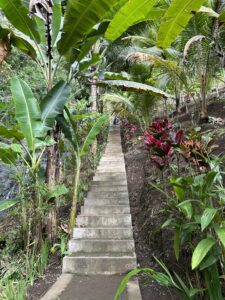It’s high time I shed light on the cryptic line in my bio.
I was fortunate enough to be handed in Thomas Mann’s book ‘The Magic Mountain’ at the time when I needed it the most. I had recently returned from travels in Bali, overwhelmed with emotion and bursting with enthusiasm to share my stories. Although I made an effort to take quick notes capturing the highlights and key observations during my travels, the urgency to savour the moment impeded me from properly dedicating time to writing. Trusting my hippocampus to have enough storage, I hoped to recall all the unwritten details later and narrate a coherent text. However, upon my return, despite the eagerness to share my astounding adventures both on paper and in person, I found myself ‘constipated’ with words. It seemed that I needed time and solitude to process it all before I was able to convey it to others in the manner it deserved. Not that I went looking for inspiration in the ‘Magic Mountain’ — I was simply desperate to divert my mind from daydreaming about Bali and the frustration stemming from the inability to ignite the same blissful emotion in those who hadn’t visited it yet. So I gladly accepted the recommendation to read something potentially of value.
“Placet experiri” — words playfully said by the character Settembrini — stuck in my head and refused to leave for days and weeks to come. “It pleases to experiment” would be a vague translation of the phrase that encompasses so much. The impotence to narrate it at the level of eloquence present in the book continues to strangle me. Those who read this masterpiece are familiar with the depth of the context and the complexity of intellectual conversations, and will understand why I will not dare to simplify them. We navigate through literary treasures, personalising parts we relate to, unapologetically taking them and running away to cherish the piece of the treasure in solace, as if sharing it with the world would diminish the precious exclusivity we own.
“Experiri” — try, experiment, experience — may sound like a checklist suggestion, but it’s about bringing awareness to how profound you wish your life experience to be. Being truthful and not putting the intuition call on hold, taking action and climbing the mountains while you can. To dare to be seduced by the temptation to open yourself to a new experience is a life worth living.
It wasn’t until I started yearning for my old pleasure of writing, that I realised what a profound impact these words — “placet experiri” — had on me. Almost as a sign (I should start believing in those) another magical sentence emerged towards the end of the book (of part I) stating ‘the ability to write beautifully can be compared to the ability to think beautifully, and that, in essence, is not far from doing beautiful deeds’. Thus I gathered the courage to embark on this journey and share it with hopefully sarcasm-savyy audience.
Get it what I mean?




